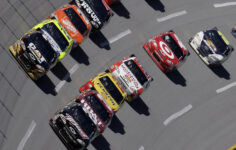It’s exciting! It’s thrilling! It’s NASCAR Sprint Cup plate racing!
During the week long build up to a race at Daytona or Talladega, this is undeniably the theme from the majority of writers covering the sport. And who can blame them? Forty-three cars mere inches at each from one another at 200 miles per hour for almost four hours?
[media-credit name=”(c) CIA Stock Photo” align=”alignright” width=”236″] [/media-credit]A man’s heart can start racing merely from the thought of it.
[/media-credit]A man’s heart can start racing merely from the thought of it.
But at what point does the entertainment value of the racing detract from the quality of the product? When do we have to step back and look at things from a much broader perspective, with long term implications?
For the casual or even non-fan, Sunday’s race at Talladega Superspeedway was beyond thrilling. The new tandem style of racing, like it or not, produces spectacular images for television. Paired cars bob and weave through others, often with a noticeable difference in speed. It can seem like a real life game of Mario Kart, minus the banana peels and turtle shells.
This article, however, goes beyond the most recent incarnation of plate racing. In fact, this goes back to one of NASCAR’s most beloved words; parity.
Now let’s look at some of the stats NASCAR and the media like to throw out there to demonstrate how ‘great’ plate racing is for the sport.
- In the last eight Talladega races there have been eight different winners
- In the last seven Daytona races, there have been seven different winners
- Roughly half of those races had a last lap pass for the victory
- Talladega is averaging over 80 lead changes over the past three races
- Daytona is averaging over 50 lead changes per race
Spectacular, is it not?
Looking past sexy tidbits of information like this, you have to begin to wonder why this is happening. Are there simply that many spectacular plate drivers on the Cup series now? Are the cars so evenly matched that there is virtually no competitive advantage anymore? Is parity so great that luck is often the deciding factor in outcomes?
It’s that last question that poses the most interesting possibility. Prior to the 2005 season, it was quite easy to name the ‘great’ plate race drivers of the era. It didn’t matter if their car was torn to bits or if they hovered at mid-pack with just a handful of laps to go. You knew that as long as they were out there, they could find a way to the front.
In a lot of ways it was because they possessed a skill set that not every driver had. Much like there are great short track racers and great road racers, there were great plate racers.
Some would argue that that was due to the quality of the cars they were driving at the time and the lack of the parity we enjoy today. But how else do you explain then a driver like Sterling Marlin scoring top fives at Daytona and Talladega with five different teams over the 1990s? Did Marlin just happen to end up with five teams with spectacular plate programs, or could it perhaps be that his skill is what put him above others during that time period?
That skill set is now no longer needed in current evolved form plate racing. The victor is typically one who was merely shuffled up to the front in the most recent round of frantic pushing and drafting. It has become almost a game of chance, devoid of any input by the driver as to the outcome rather than the game of chess we have seen in years past.
Sure there was the occasional surprise winner here and there, but that was the nature of the track. We like the occasional under-dog sneaking through with a victory. That was part of the appeal of the races, the unknown. Drivers like Dale Jarrett enjoying one last hurrah with a victory or Bobby Hillin, Jr. shocking the sport with a lone victory. Much like the old Bristol Motor Speedway, it gave the fan a sense of intensity and anticipation as to what may happen.
What happens though when that unknown because a regular occurrence? What happens when the unknown becomes a defined prescience?
And finally, what does it say when the crown jewel event of the sport, the Daytona 500, can now seemingly be decided mostly by chance? It’s been five years since the winner of the Daytona 500 finished in the top ten in points, a remarkable stretch which underscores the lack of relevance of a 500 victory.
In fact, the four races of as a whole could almost be considered detrimental to the season long points battle. In a lot of ways one could gather the same outcome by merely drawing names out of a hat. Winning at Talladega or Daytona doesn’t make you a championship contender, it just means you were up front at the right time.
Don’t get me wrong, I find plate racing as thrilling as the next fan. It is not a recent occurrence as this fact has been building for the better part of the last decade.
At some point, someone has to question what price we pay for the excitement. Clearly I do not have a solution to this possible problem, nor am I sure there is any good solution. One possible solution would be to remove Talladega from the Chase if this continues. Keeping there would be like asking teams during the MLB playoffs to play a game of Rock, Paper, Scissors to decide who gets credit for a series win.
It’s not fair and it takes away from the meaningfulness of a championship.
Who knew NASCAR’s quest for parity would have such a surprisingly, and worrying, outcome?








I walked out on the Talladega race this past weekend…BORING
Definitely a need for a major change…maybe less cubic inches?
Something must be done…dual tandem racing is BORING.